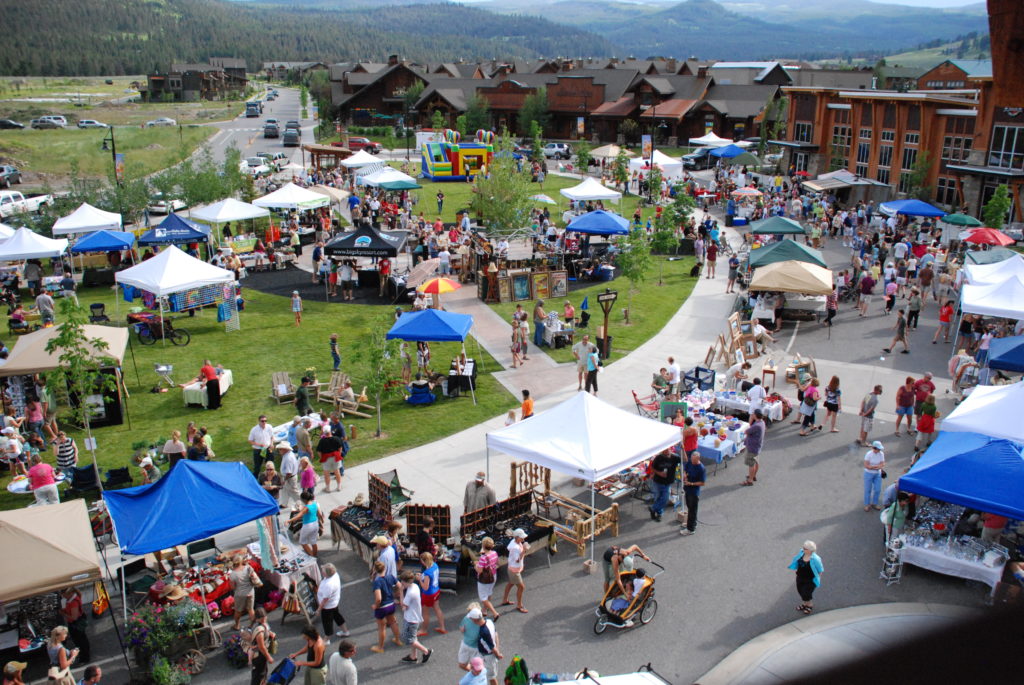By Mira Brody EBS ARTS & ENTERTAINMENT EDITOR
SOUTHWEST MONTANA – Strolling through vibrant booths of homemade goods, fresh produce and aromatic food trucks; the farmers market is a memory seared into many of our minds. Whether it’s picking out a handful of colorful honey sticks, dancing to live music or perusing the aisles of vegetable starts and leafy greens, it is often a mark of summer and, with a few minor alterations, will continue to be in southwest Montana.
The Big Sky Farmers Market, Bozeman’s Bogert Farmers Market and the Livingston Farmers Market are all on-par to open this summer, but must comply with social distancing guidelines. Under Gov. Steve Bullock’s order, farmers markets are considered an essential service and are treated the same way as grocery stores.
Booths will be spaced further apart, vendors must pre-register, there will be no children’s booth allowed until Phase 3, all vendors will be required to wear masks and have hand sanitizer at each station and, in order to prevent large groupings of people, picnic tables will be removed and there will be no live music or entertainment this summer.
Despite these alterations, the COVID-19 pandemic has brought to light the many benefits of a localized food system as consumers recognize the weaknesses in the industrialized supply chain, the importance of eating healthy, fresh foods for immune system support and the power of circulating money in the local economy.
“If it’s closer to home, there’s more confidence that animals are being treated better and the conditions are better. There’s also a lot of evidence that shows the sooner you eat a vegetable that has been picked that day, the more nutritious it is,” said Lill Erickson, executive director of Western Sustainability Exchange, the market organizer and a Livingston-based nonprofit that specializes in regenerative agriculture and rural economic development. “The great thing about our local food market is we don’t have to wait to make a decision. We can be a part of a solution here, and that empowers people.”
According to Katie Plumb, owner of Farm Cart, a Bozeman-based local food subscription service, buying local also ensures a level of accountability that large chains don’t feel tethered to because of their distance from their consumers.
“In the national or international food system, the money you spend doesn’t really make it into the hands of the people who actually grew it/harvested it/raised it,” said Plumb. “Which begs the question of where’s the incentive for those producers to create a healthy, quality product if they’re only seeing a teeny tiny fraction of the sale of each unit they produce?”
Farm Cart delivers weekly packages within a 10-mile radius to downtown Bozeman and offers a wide variety of local goods from all over the state, including dairy, meat, breads, dips, spices as well as produce and each delivery includes suggested recipes. They buy directly from farmers, ranchers and local businesses and local distributors who are bringing foods to the Bozeman area from other parts of the state, like Western Montana Growers Cooperative out of Missoula, creating an economic radius of about 200 miles, with the greatest concentration within 20-30 miles of Bozeman.
Because of her convenient delivery service, Plumb saw an uptick in subscriptions during COVID-19 and is happy to see that not many people have dropped off since.
“I think that’s in part because people are cautious, and in part because once people start getting Farm Cart deliveries, they begin to appreciate not only the convenience of delivery, but also the quality of the local foods being provided,” said Plumb.
Erickson said markets also meet the unmet needs in the community that have been further brought to light since the pandemic. WSE administers the Senior Farmers Market Nutrition Program to Park County by providing $50 vouchers to low-income seniors for fresh fruits, vegetables and honey. This year, WSE is doubling the number of vouchers to 100 senior citizens and connecting them to proxy shoppers who can do their shopping for them.
At the Big Sky market, roughly 90 vendors sell their products every Wednesday night and this year, the market will stretch from Fire Pit Park down Town Center Avenue and into the new Town Center Plaza by the Wilson Hotel. Farmers markets also produce their own sub-economies—vendors buy from each other—and act as an incubator for businesses. A lot of small businesses get their start at a market booth, outgrow as their customer base expands and makes room for a new start-up.
In lieu of live music, Big Sky is going to live stream performances from local musicians through the sound system, allowing them to support local artists and still be in compliance.
“The farmers market in Big Sky downtown Center is where everyone comes together in the summertime,” said Erik Morrison, the director of the Big Sky market, which is in its 12th year. “It’s a social celebration of the arts and culture of our little community. It has a special place in all of our hearts.”
Big Sky Farmers Market
Every Wednesday from June 17 through Aug. 26 from 5-8 p.m. The market will run from Fire Pit Park down Town Hall Center Avenue and into Town Center Plaza by the Wilson Hotel.
Livingston Farmers Market
Every Wednesday from June 10 through September 16 from 4:30 p.m. to 7:30 p.m. at Miles Bandshell Park. The Market has designated 4:30-5:30 PM for at-risk patrons.
Bogert Farmers Market
Every Tuesday from June 9 to Sept. 9 from 5 p.m. to 8 p.m. at Lindley Park.













